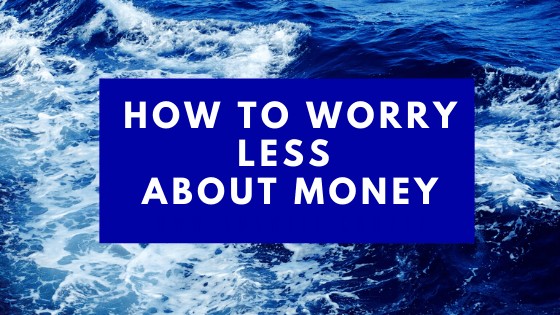Podcast: Play in new window | Download
Subscribe: Apple Podcasts | Spotify | Amazon Music | RSS | More
How Often Do You Worry About Money?
If you’re like most Americans, you worry about money every single day.
And that’s from a study from last year, before the Corona Shutdown!
Ick.
That is not how I’d like us to be spending our mental brain power, warriors.
That’s a lot of time generating a negative feeling state and one that is known to be useless and a complete waste of time.
Worrying is a Waste of Time
Sitting and worrying about money accomplishes NOTHING helpful. It gets us nowhere productive. It doesn’t help us save 
Life is full of enough uncomfortable feelings. Sitting and thinking thoughts that foster a negative feeling state is not the way I choose to live the life I’m living. Now I’m not saying to ignore the worry and put your head under the sand. Feelings are here to alert us to pay attention to something. Rather, if you spend time worrying about money, consider that a sign that something is off. View your worry as a signal you need to start taking action in this area of your life.
How to Worry Less
Today’s blog is designed to give you four tools to start ‘doing’ and stop worrying. Start using any one of these tools today and you will end up worrying less. These tools enable you to spend less time worrying and more time feeling in control and at peace.
The more structures we have in place to manage our money, the less worry, angst, or anxiety we feel. The more we know about the funds coming in and the funds going out, the calmer we feel and the more in control of our life we are.
We feel out of control or overwhelmed when we don’t know what’s going on.
We get to feel in control of our finances when we know how much money is coming in, how much is going out, how much extra we have each month and what we will do with that extra.
If you’re like most of us, your brain will resist this step. Even though worrying doesn’t feel great, our brain’s motivational triad avoids discomfort and doing things differently. Choose to over-ride your brain to bring financial peace.
Lift Your Head Up and Look
The first step is sometimes the hardest. It’s definitely the one our brain resists the most if we’re not accustomed to doing it. I urge you to override your brain’s motivational triad and do this first step. Look. Be aware. Open up your money accounts (bank, credit cards, etc) and look at the following four things:
-How much money do you currently have? (this will be a negative number if you have debt)
-How much money is coming in to your household each month?
-How much you require to live (rent, mortgage, car or loan payments, food, utilities, etc..)?nd
-Where your dollars go? (What do you spend your money on monthly in addition to the above?)
This will take about 15 minutes so please don’t try to email me fancy excuses of how you don’t have time. You have spent far more than 15 minutes worrying about your finances and feeling the ick. Drop the self judgement, sit down, and look.
The Easy Part: 4 Tools to Worry Less
The second piece is the fun piece because we start doing. Here are four tools that will help you worry less. Let’s look at how we handle money functionally by investigating two areas: our spending and our bills.
Habits are behaviors that we’ve done over and over and are now unconscious routines. This extends to money and it’s helpful to be aware of what our money habits are. For example, making money is a habit; being broke is a habit; spending when stressed is a habit. Let’s take some time to look at your financial habits and make small shifts where necessary:
SPENDING:
How do you spend your money? Deliberately, intentionally, and mindfully? Or impulsively, over-indulgently, and recklessly? Here are two tools I use that may help wherever you are with your spending habits:
TOOL ONE: The 24 Hour Rule:
When shopping online, I never purchase in the same day that I put the item in my cart. I will look at certain stores and put items in my shopping cart with the agreement to myself that if I want it, I can purchase it 24-hours from then. This helps disrupt any automatic pattern of dopamine and makes sure that I’m not spending or buying things instead of feeling an emotion. When I’m shopping in person (i.e. not online), I get intentional about what I am looking for and what I intend to purchase. For me, this is especially important with places like Target where I could go in to buy socks and walk out with new patio furniture (it’s happened!). Consciously stop and ask yourself before entering any store, whether it’s Ann Taylor or your local supermarket, what are you planning to purchase? If, while in the store you see something else that your brain tells you you need, snap a picture and, if you still want it the next day, go back and get it. Try it. This has helped me cut back on my spending tremendously.
TOOL TWO: Consult:
If I am going to purchase something over a certain amount, I first consult with someone I trust. That number varies depending on my spending goals. Right now, that number for me is $100 and I consult with my husband. When I was single, I would consult with my kids.
It’s helpful to note that I am not consulting with them to seek their approval. Rather, in talking to them and telling them of my intended purchase, I get clear on why I’m considering the purchase and I make the spending even more conscious and deliberate. Who could you consult with and what would your number be?
These next two tools are for those who have no debt (other than a house mortgage). By far, the most important thing you can do to manage your financial stress is to eliminate debt; to stop spending above your means. Our relationship with money can be a complicated one and, if you’re in debt, that’s a signal that money blocks are present and points to the necessity of getting a coach. There are many tools I teach to help chisel away at debt with one-on-one clients and I don’t address those here. And now, as I said, if you have no debt, these next two tools address organizing and managing your bills and expenses and will help you feel more ease with regards to money.
TOOL THREE: Automate:
How do you pay your bills? How much stress do you have about paying your bills? How much time does it take to pay your bills? How often do you put off paying your bills?
Get as many of your bills set up to pay automatically as possible. Eliminate the stress that you will miss a payment or be late by automating it. These days, it’s rare that a company doesn’t offer this service. Get out your calendar and schedule 30-60 minutes to do this in the next week. Before that time arrives, start keeping a list of the bills that you pay. I suggest having a notepad out on a counter so you can jot down the bills as they come to mind: Gas, Utility, Rent, Amazon, Netflix, Medical, etc….Which subscriptions do you have? Which bills arrive in the mail? Write those companies on your list. When your scheduled time arrives, sit down with that list and get to work.
Automating and simplifying the bill paying process will save you time and energy.
TOOL FOUR: Consolidate
The more you have to manage, the more stress there is in your life. This goes for money and accounts too.
How many different credit cards, store accounts, and bank accounts do you have? The goal is to be able to count this number on your hands. What different store accounts and credit cards do you have? Who do you have checking or savings accounts with?
Less is more. You don’t need a separate card for gas and a separate one for travel and a separate one for sweater buying and a separate one for your dog’s food. Once you adjust your relationship with money, saving 30 cents a month because of some loyalty points gas program will be unnecessary. Consolidate your life for your life. Paying regular price for something is a fine price to pay for your sanity.
It’s Your Turn
There are two types of people in the world. Those who will listen to this podcast, nod along and then, when it’s over, move on to something else. Then there are those who want to feel differently and will take action to feel differently. That type of person will get started using one of these money tools this week.
Let me know in the comments below, which type are you?
If you don’t yet get the weekly newsletter full of tricks and tips, what are you waiting for? This week I gave out a free resource to work through money issues with your partner. People are saying it’s a hit! Sign up now to join in the fun!






Trackbacks/Pingbacks